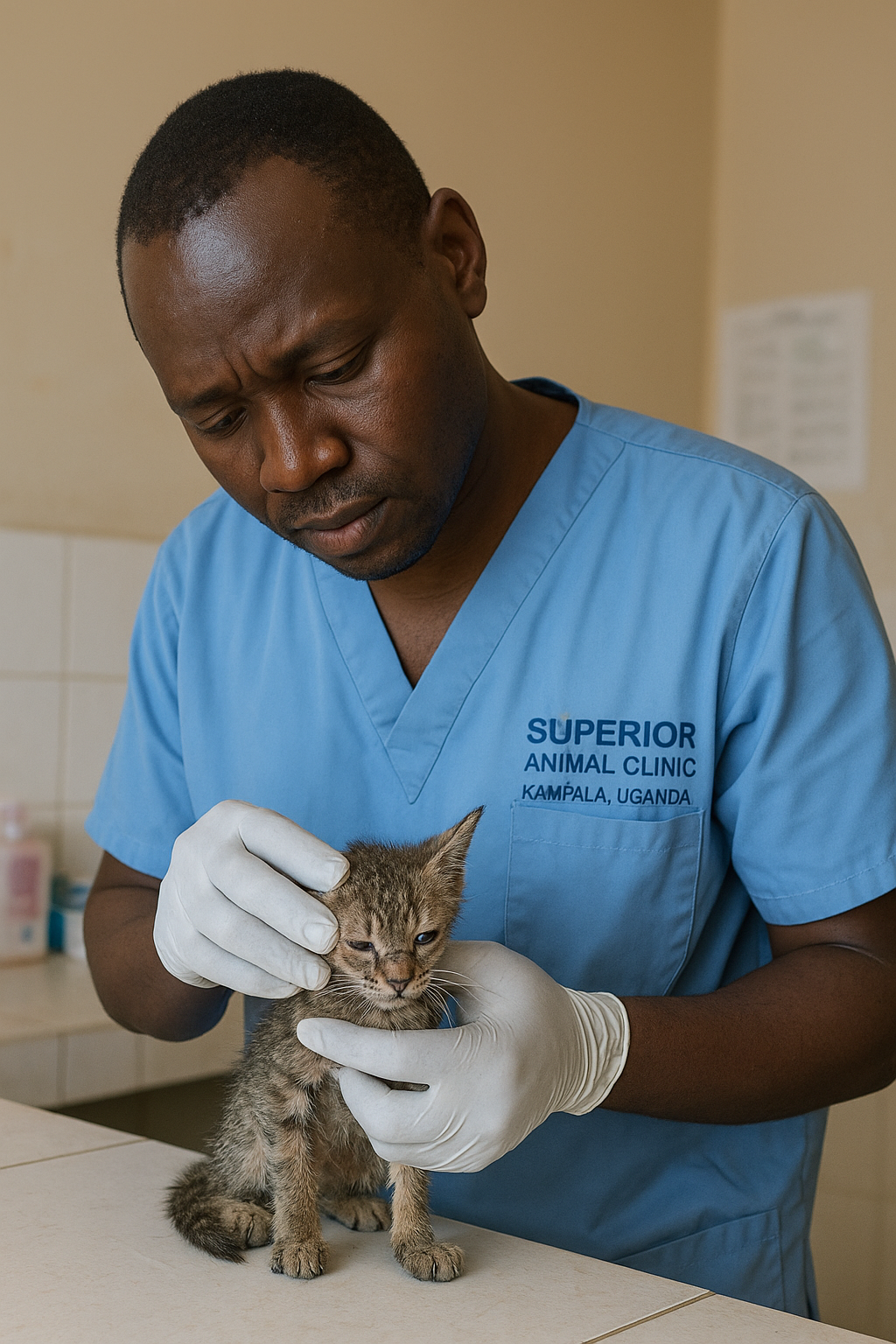
Last month, a worried cat owner from Muyenga rushed into Superior Animal Clinic carrying her tiny kitten, Milo.
He had stopped eating, was vomiting, and could barely lift his head. She thought it was just “a simple stomach upset” — but within hours, Milo’s condition worsened.
After running quick lab tests, our veterinary team confirmed it was Feline Panleukopenia (also called Feline Distemper) — a highly contagious viral disease that’s been affecting many cats around Makindye, Nsambya, Bugolobi, and Ntinda lately.
Fortunately, because Milo’s owner acted fast, we immediately began IV treatment, fluids, antibiotics, and immune boosters. After a week of intensive care, Milo made a full recovery and was back home — playful, purring, and healthy again.
Sadly, not all cats are that lucky. Many cat owners in Kampala delay visiting the vet, thinking their cat will “get better on its own,” only to lose them within days.
That’s why if your cat suddenly becomes weak, refuses food, or starts vomiting — it’s time to act.
At Superior Animal Clinic in Makindye along Salaama Road, we specialize in diagnosing, treating, and saving cats with Panleukopenia across Ntinda, Nsambya, Muyenga, Buziga, Munyonyo, Katwe, Ndejje, and all surrounding areas of Kampala.
🧬 What Is Panleukopenia in Cats?
Panleukopenia, also called Feline Distemper or Feline Parvovirus, is a highly contagious and deadly viral disease that attacks your cat’s immune system, digestive tract, and bone marrow.
It spreads quickly — especially in areas with unvaccinated or stray cats such as Katwe, Kasubi, Old Kampala, Nsambya, and Makindye.
Kittens between 2–6 months are most vulnerable, but any unvaccinated cat can be infected.
Symptoms of Panleukopenia in Cats in Uganda
At Superior Animal Clinic in Makindye, Kampala, we often see cat owners bringing in kittens or adult cats too late, simply because they didn’t recognize the early signs of Panleukopenia (Feline Distemper). This disease can progress rapidly, sometimes killing a kitten within just 2–5 days if untreated.
Knowing the symptoms early can save your cat’s life.
1️⃣ Sudden Loss of Appetite
One of the earliest signs is a cat refusing food. You might notice your kitten turning away from favorite treats or not eating its usual meals.
💡 Tip: Even a small drop in appetite in a kitten under 6 months should prompt a vet visit.
2️⃣ Vomiting and Diarrhea
Cats with Panleukopenia often experience persistent vomiting and watery or bloody diarrhea. This leads to rapid dehydration, which can be fatal within days.
This symptom is one of the main reasons owners from Makindye, Nsambya, Muyenga, and Bugolobi rush their cats to Superior Animal Clinic.
3️⃣ Fever or Low Body Temperature
Initially, infected cats may have a high fever, but as the disease progresses, their body temperature may drop — a sign that the cat’s body is struggling to fight the virus.
4️⃣ Weakness and Lethargy
Even before vomiting or diarrhea starts, many cats become quiet, withdrawn, or unusually sleepy. You might notice your cat avoiding play or hiding in corners — a subtle but critical warning.
5️⃣ Dehydration
Due to vomiting and diarrhea, cats lose fluids fast. Look for sunken eyes, dry gums, and reduced skin elasticity (when you gently pinch the skin at the back of the neck, it doesn’t snap back quickly).
6️⃣ Pale Gums and Mucous Membranes
Because Panleukopenia attacks the bone marrow, cats often develop low white blood cell counts, causing pale or whitish gums. This is a serious sign and requires immediate veterinary attention.
7️⃣ Unsteady Movement and Trembling
In severe cases, particularly in kittens, you might notice trembling, uncoordinated walking, or weakness in the limbs. This is sometimes confused with neurological problems, but in Uganda, it’s often due to Panleukopenia-related dehydration and malnutrition.
8️⃣ Secondary Infections
Cats with Panleukopenia are highly susceptible to secondary bacterial infections, which can cause additional symptoms like:
✅ Key Takeaway for Cat Owners
If your cat shows any combination of vomiting, diarrhea, loss of appetite, weakness, or pale gums, treat it as an emergency. Panleukopenia progresses fast, and Superior Animal Clinic in Makindye, Kampala is fully equipped to diagnose, treat, and support your cat through recovery.
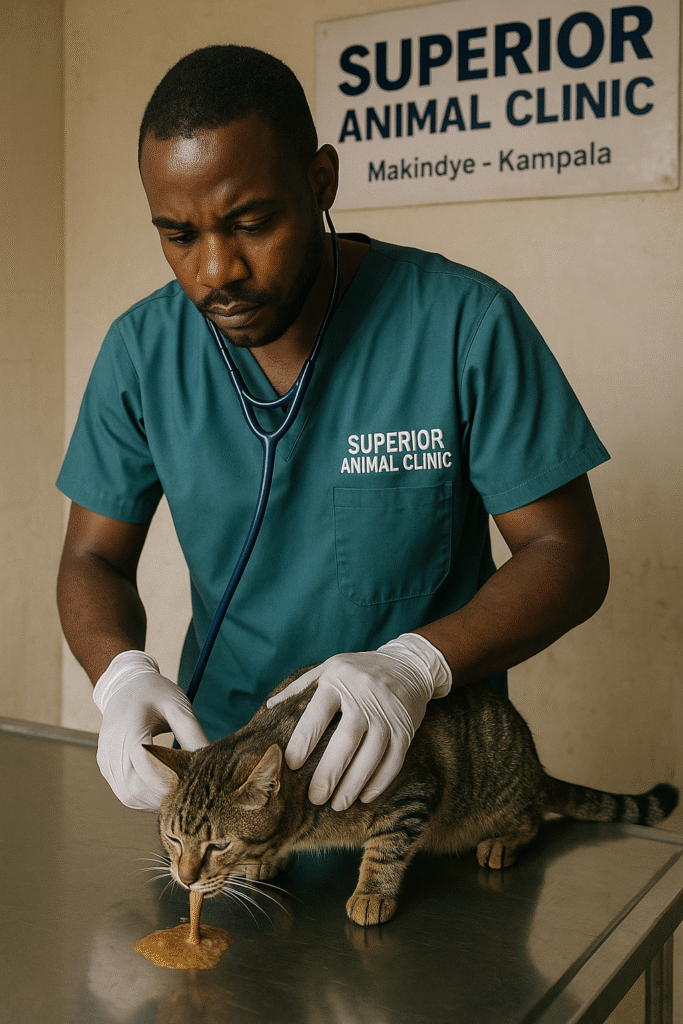
🔬 What Causes Panleukopenia in Cats in Uganda?
Panleukopenia (feline distemper) is caused by the Feline Panleukopenia Virus (FPV) — a small but extremely hardy virus that attacks a cat’s immune system and intestinal lining. But saying “it’s caused by a virus” is the short version. Here’s the part every cat owner in Kampala should know — the everyday, real-world causes and how the virus actually gets into our homes and litters.
1. Direct contact with an infected cat
The most common way cats pick up FPV is direct contact — sniffing, grooming, or sharing space with an infected cat or kitten. This is why households, boarding facilities, and shelters in busy neighborhoods like Katwe, Makindye, Nsambya, and Old Kampala can see fast outbreaks.
2. Contaminated feces and litter boxes
FPV is shed in high amounts in the feces and vomit of infected cats. A single contaminated litter box, carrier, or cage can infect other cats for many months if not properly disinfected. That’s why multi-cat homes and rescue centers in places like Bugolobi, Buziga, and Munyonyo must be extra careful.
3. Fomites — the invisible spreaders (shoes, clothing, bowls, cages)
You don’t need to bring a sick cat into your house for FPV to arrive — the virus clings to shoes, clothes, bedding, grooming tools, carriers, and food bowls. A neighbor, street cat, or even a rescuer’s hands can carry the virus into your home unknowingly.
4. Unvaccinated kittens and immunity gaps
Kittens are most at risk. Newborns get temporary protection from their mother’s antibodies, but that protection fades — and until they complete their vaccine series they have a window of vulnerability. In Kampala many kittens are unvaccinated or start vaccination late, leaving neighborhoods like Lungujja, Kasubi, and Old Kampala with vulnerable kitten populations.
5. Environmental persistence — it survives a long time
FPV is very resistant in the environment — it can survive for months to a year in the right conditions (damp, shaded areas, bedding, or soil). Ordinary cleaning isn’t enough; effective disinfection (e.g., a fresh bleach solution or veterinary disinfectants) is needed to break it down.
6. Overcrowding, poor sanitation, and stray populations
Crowded conditions (shelters, markets, apartment blocks) and poor sanitation increase the risk. High stray cat numbers around markets and dumping sites in Katwe, Nakawa, and parts of Rubaga create reservoirs of infection that repeatedly seed household outbreaks.
7. Co-infections and poor nutrition weaken resistance
Cats already weakened by parasites, respiratory infections, or malnutrition have weaker immune systems and are more likely to develop severe disease if exposed. This is a common problem in rescued or orphaned kittens in Kampala suburbs.
8. Transmission from mother to kitten
An infected queen (mother cat) can pass the virus to her kittens — either in utero, during birth, or immediately after — especially if she was sick or unvaccinated during pregnancy.
9. Misunderstandings: dogs, humans, and other pets
- Humans and dogs do not get FPV. You cannot “catch” it from your cat.
- Dogs do not normally transmit FPV (dog parvovirus is a different, related virus). However, dog owners can still carry the virus on shoes or clothing if they come into contact with contaminated environments.
🐱 Which Cats Are Most Affected by Panleukopenia in Uganda?
At Superior Animal Clinic in Makindye, Kampala, we’ve noticed a clear pattern — some cats are much more vulnerable to Panleukopenia (Feline Distemper) than others. Understanding which cats are most at risk helps you act quickly and possibly save your cat’s life.
🐾 1. Unvaccinated Cats and Kittens
The most affected group are unvaccinated kittens and young cats below 1 year old. Their immune systems are still developing, making them easy targets for the feline parvovirus that causes Panleukopenia.
We often see kittens brought in from Nsambya, Makindye, Katwe, and Bugolobi that have never been vaccinated — and sadly, many arrive too late.
💡 Tip: The Panleukopenia vaccine (part of the core FVRCP vaccine) can save your cat’s life. Book your cat’s vaccination appointment at Superior Animal Clinic, Makindye, today.
2. Stray and Outdoor Cats
Cats that roam freely outdoors — especially those in Katwe, Lungujja, Kasubi, and Ndejje — are more likely to encounter infected cats or contaminated environments.
Panleukopenia is extremely contagious, and the virus can survive on the ground, clothing, shoes, or even in litter boxes for months.
That’s why outdoor cats, community cats, and even those rescued from the streets are at very high risk if not vaccinated or dewormed regularly.
3. Cats with Weak or Compromised Immunity
Older cats, sick cats, or those recovering from other infections (like flu, parasites, or malnutrition) are more likely to develop Panleukopenia.
In Kampala, we often see this among cats that have been poorly fed or neglected — especially in areas where veterinary access is limited, such as Mutundwe, Kabowa, and Bulindo.
At Superior Animal Clinic, our vets always check your cat’s overall health to strengthen their immunity and lower their risk of infection.
4. Shelter and Rescue Cats
Cats living in crowded shelters, adoption centers, or catteries face higher exposure to the virus.
In places like Rubaga, Mityana, and Old Kampala, we often receive calls from cat rescuers and NGOs reporting sudden deaths among kittens — later confirmed to be Panleukopenia outbreaks.
If you run a rescue center or foster cats, regular disinfection, vaccination, and health checks at Superior Animal Clinic can prevent devastating outbreaks.
5. Pregnant Cats and Newborn Kittens
Pregnant cats that contract Panleukopenia can lose their litter, or give birth to kittens with cerebellar hypoplasia — a condition that affects movement and balance.
This is common among unvaccinated queens in Muyenga, Munyonyo, and Buziga.
Protecting your female cat with timely vaccination before breeding is one of the best ways to prevent this tragedy.
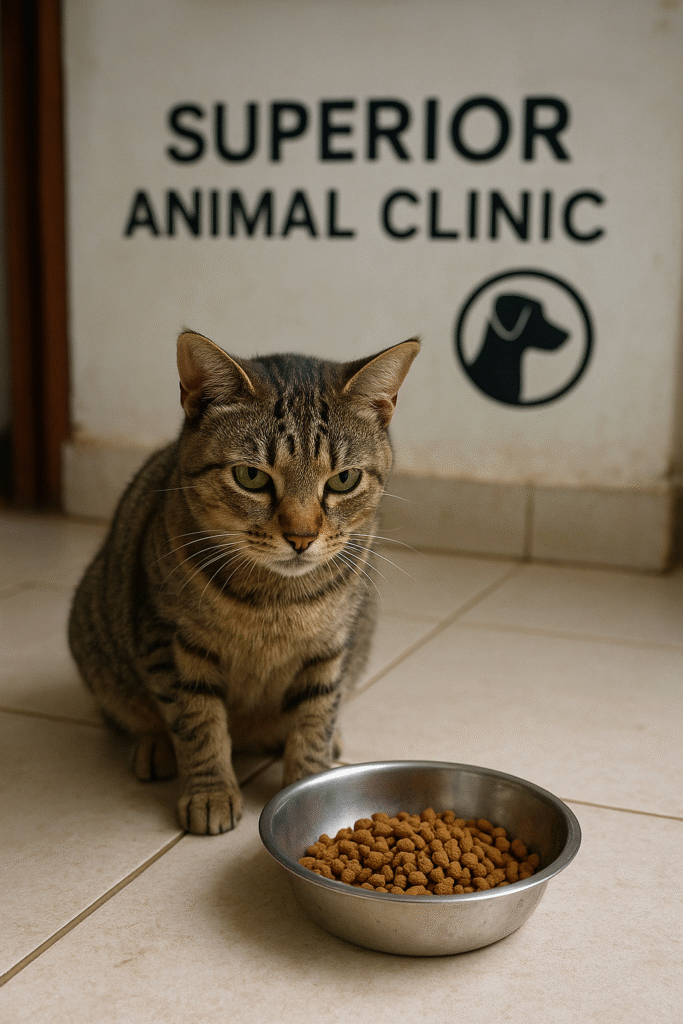
In Summary
Panleukopenia doesn’t choose by breed — it chooses by immunity.
Unvaccinated, outdoor, young, or weak cats are the most affected in Kampala and surrounding areas.
But the good news? With early diagnosis, expert care, and vaccination at Superior Animal Clinic, your cat can be fully protected from this deadly disease.
Diagnosis of Panleukopenia at Superior Animal Clinic
When you bring your cat to Superior Animal Clinic, our experienced vets first take a detailed history and perform a physical examination.
We then run specific laboratory tests, including:
- Fecal antigen tests to confirm Panleukopenia virus
- Blood tests to check white blood cell levels
- Ultrasound or abdominal exams to assess internal damage
Our in-house diagnostic lab allows us to confirm Panleukopenia within minutes, so treatment can start right away.
Step-by-Step Panleukopenia Treatment Process at Superior Animal Clinic
When a cat suspected of Panleukopenia is brought to Superior Animal Clinic, here’s exactly what happens:
1. Quick Diagnosis and Blood Testing
Our veterinarians first conduct a physical examination and blood test to confirm the diagnosis.
We look for symptoms like severe vomiting, diarrhea, fever, loss of appetite, dehydration, and low white blood cell count.
Early testing helps us start treatment immediately — increasing survival chances dramatically.
2. Intravenous Fluid Therapy (Rehydration)
Because Panleukopenia causes extreme dehydration, we start with IV fluid therapy to restore lost fluids and electrolytes.
This helps your cat regain energy and prevents shock — which is often the main cause of death in untreated cases.
At our Makindye clinic, our trained veterinary nurses carefully monitor each cat’s fluid balance every few hours.
3. Antibiotic and Antiviral Support
Even though Panleukopenia is viral, secondary bacterial infections are common because of the weakened immune system.
We administer broad-spectrum antibiotics and immune boosters to protect your cat from additional infections.
In severe cases, antivirals and vitamin injections are also given to help fight off the virus faster.
4. Blood Transfusion (for Severe Anemia)
Many cats with Panleukopenia suffer from severe anemia due to virus-induced bone marrow suppression.
At Superior Animal Clinic, we provide life-saving blood transfusions from carefully screened donor cats.
This restores oxygen levels and helps stabilize weak or collapsing cats — a procedure only a few clinics in Uganda are equipped to perform.
5. Nutritional and Appetite Support
Cats with Panleukopenia often refuse food. We provide nutritional supplements, appetite stimulants, and carefully selected digestible diets to help them regain strength.
Our team may also use feeding tubes for extremely weak cats to ensure they receive enough nutrients to recover.
6. Constant Monitoring and Intensive Care
At Superior Animal Clinic, our veterinary staff provides 24-hour monitoring and supportive care — including temperature checks, hydration monitoring, and progress updates to the owner.
We understand that every cat is unique, so we tailor the treatment plan based on the severity of illness and age of the cat.
7. Disinfection and Home Care Guidance
Before your cat goes home, we guide you on how to disinfect your home environment — litter boxes, bedding, bowls, and floors — because the virus can live for months.
We also schedule follow-up appointments and vaccination reminders to prevent re-infection.
When to Bring Your Cat to the Vet
If your cat is vomiting, refusing food, has diarrhea, or is unusually weak, do not wait.
Every hour matters.
Bring them immediately to Superior Animal Clinic, Makindye, or call our team for emergency assistance.
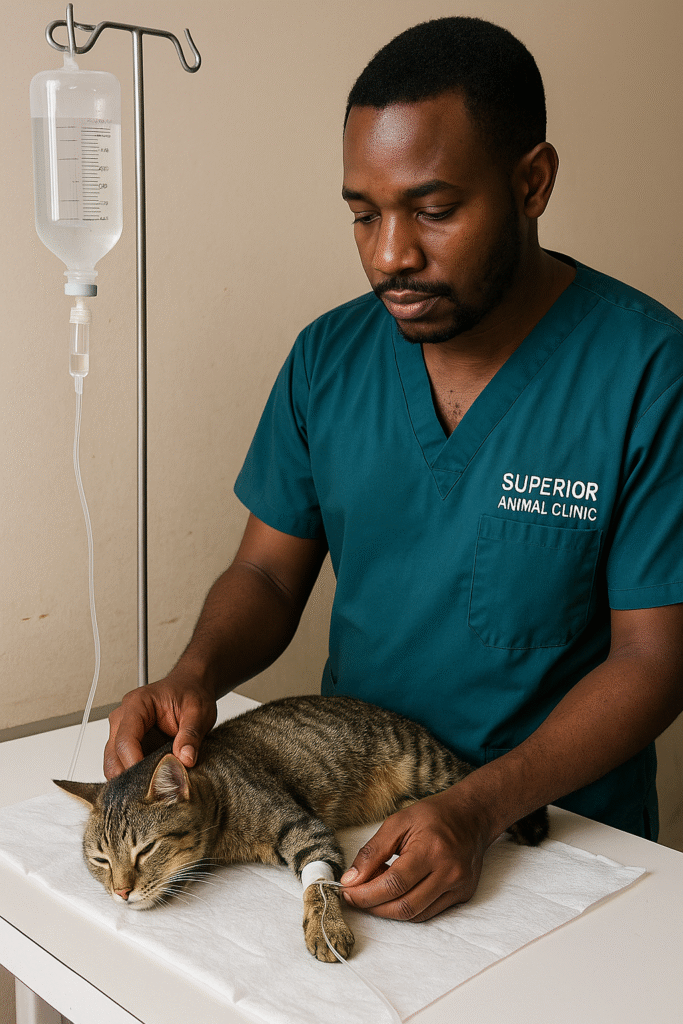
Home Care & Remedies for Panleukopenia in Cats
While home remedies alone cannot cure Panleukopenia, you can help your cat recover after vet treatment by:
- Keeping your cat hydrated with clean water
- Offering soft, digestible food (like boiled chicken or fish)
- Maintaining a warm, clean, quiet environment
- Disinfecting your cat’s litter box and bedding regularly
Avoid using unverified herbal remedies — they often worsen the situation.
Always follow your vet’s instructions from Superior Animal Clinic.
Where Panleukopenia Is Common in Uganda
Panleukopenia is most common in urban and peri-urban areas such as Kampala, Mityana, Mukono, and Wakiso, where many stray or unvaccinated cats live.
In Kampala, neighborhoods like Makindye, Nsambya, Katwe, Kasubi, Lungujja, and Old Kampala report frequent outbreaks.
How to Prevent Panleukopenia in Cats in Uganda
If you love your cat like family, prevention is the best protection you can ever offer.
At Superior Animal Clinic in Makindye, Kampala, we’ve seen how heartbreaking it can be for pet owners to lose a cat to Panleukopenia — especially when it could have been prevented with simple steps.
Here’s how you can protect your cat from Panleukopenia and keep them safe across Kampala.
1. Vaccinate Your Cat Early and Keep Boosters Up to Date
The Panleukopenia vaccine (part of the FVRCP vaccine) is the most effective way to protect your cat.
At Superior Animal Clinic, our veterinarians recommend:
- First vaccination at 6–8 weeks of age
- A booster every 3–4 weeks until your cat is about 16 weeks old
- Yearly boosters after that to maintain full immunity
✅ Tip: Even indoor cats need vaccination — the virus can cling to your shoes, clothes, or visitors and infect your pet.
Many cat owners from Makindye, Ndejje, Lubowa, and Mutundwe now schedule annual vaccination visits with us to avoid future heartbreak.
2. Keep Your Cat’s Environment Clean and Disinfected
Panleukopenia virus is extremely tough — it can survive for over a year in contaminated places!
To reduce risk:
- Regularly wash food and water bowls with hot water and disinfectant
- Clean litter boxes daily
- Use bleach-based disinfectants on surfaces and floors
- Avoid sharing bedding or feeding items between cats
At Superior Animal Clinic, we also provide safe cat disinfectant advice for homes, shelters, and catteries in Bugolobi, Rubaga, and Kasubi.
3. Limit Outdoor Access and Contact with Stray Cats
Cats that roam outdoors in Katwe, Lungujja, and Ndejje often come into contact with infected street cats or contaminated soil.
If possible, keep your cat indoors or in a secure outdoor area where they can’t mingle with unknown cats.
If you rescue stray kittens or foster cats, always quarantine them for 14 days and have them checked at Superior Animal Clinic before introducing them to your other pets.
4. Strengthen Your Cat’s Immune System
A strong immune system helps your cat fight off infections faster.
Feed your cat high-quality, balanced food, provide fresh clean water, and ensure deworming and flea control are done regularly.
At Superior Animal Clinic, we provide personalized nutrition and deworming plans for cats in Ntinda, Muyenga, and Munyonyo to keep them healthy all year long.
5. Schedule Regular Vet Check-ups
Panleukopenia can develop quickly, and early detection makes all the difference.
Bringing your cat for routine checkups at least twice a year allows our vets to spot any early warning signs before they become life-threatening.
Whether you’re in Makindye, Nsambya, Bugolobi, or Ntinda, our experienced veterinary team at Superior Animal Clinic is always ready to help keep your cat safe and healthy.
6. Disinfect After Handling Sick Cats or Visiting Shelters
If you volunteer or rescue cats in areas like Rubaga, Mityana, or Katwe, always change clothes, wash hands, and disinfect shoes before touching your own pets.
The virus can easily spread through fur, cages, blankets, and even your hands — prevention starts with hygiene.
🌿 7. Educate Others
Many cat owners in Kampala still don’t know that Panleukopenia is preventable.
Share this knowledge with neighbors, rescue groups, and friends who own cats.
Helping others vaccinate and care for their cats also reduces the spread in your community.
The Bottom Line
Panleukopenia is deadly but preventable.
A single vaccination and good hygiene can save your cat’s life.
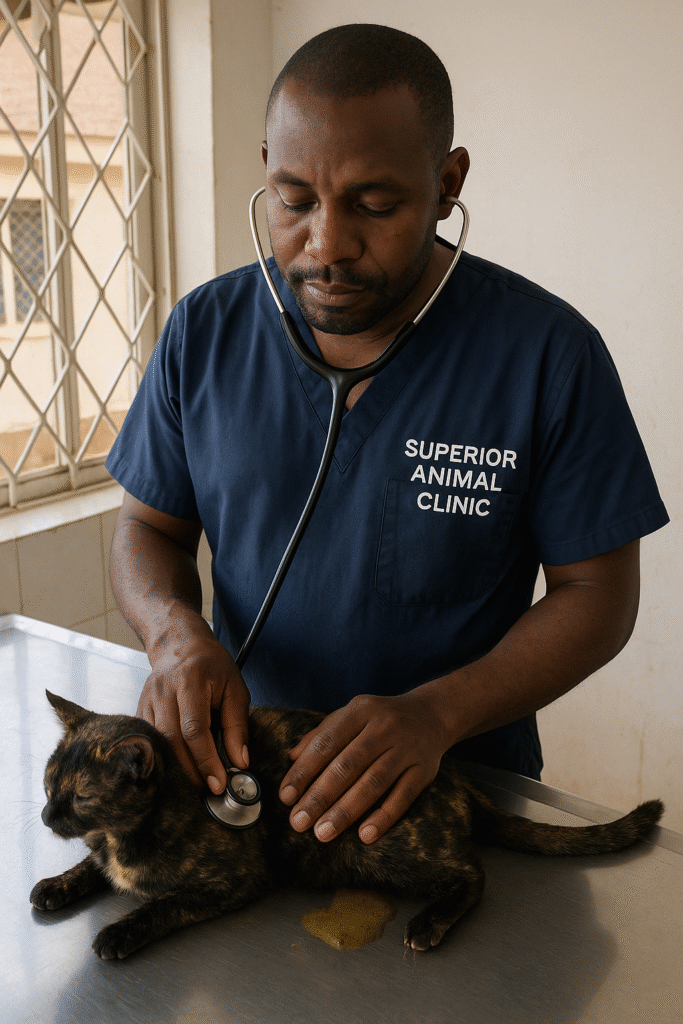
🌟 Why Superior Animal Clinic Is the Best Veterinary Clinic for Cat Panleukopenia in Kampala
- ✅ Experienced veterinarians specializing in cat infectious diseases
- ✅ Fully equipped diagnostic laboratory in Makindye
- ✅ Affordable, compassionate treatment
- ✅ 24/7 emergency services for critical cats
- ✅ Serving clients across Ntinda, Ndejje, Muyenga, Buziga, Munyonyo, Kololo, Rubaga, and beyond
When your cat is sick with Panleukopenia, don’t wait — call or visit Superior Animal Clinic immediately for professional help.
🐾 FAQs: Panleukopenia in Cats – Kampala, Uganda
1. What is Panleukopenia in cats?
Panleukopenia, also known as Feline Distemper, is a highly contagious viral disease that attacks a cat’s immune system and intestines. It is most common in kittens and unvaccinated cats in Kampala and surrounding areas like Makindye, Nsambya, and Muyenga.
2. What are the symptoms of Panleukopenia in cats in Kampala?
Watch for vomiting, diarrhea (sometimes bloody), loss of appetite, lethargy, fever or low body temperature, dehydration, and pale gums. Early detection is key — cats in Ntinda, Bugolobi, Katwe, and Old Kampala are often brought to Superior Animal Clinic with these signs.
3. How do cats get Panleukopenia in Uganda?
The virus spreads through contact with infected cats, contaminated litter boxes, bedding, food bowls, cages, or even shoes and clothing. Outdoor and stray cats, common in Kasubi, Lungujja, and Ndejje, are at higher risk.
4. Can Panleukopenia spread to humans or dogs?
No, Panleukopenia only affects cats. Humans and dogs cannot catch it, but humans can carry the virus on shoes, clothing, or hands, spreading it to other cats in Kampala homes or shelters.
5. How is Panleukopenia treated in cats in Kampala?
There is no direct cure, but early supportive care saves lives. At Superior Animal Clinic, Makindye, we provide:
- IV fluids to prevent dehydration
- Antibiotics to prevent secondary infections
- Anti-vomiting medication
- Nutritional and immune support
- Intensive monitoring and isolation
6. How much does it cost to treat Panleukopenia in cats in Kampala?
Costs vary depending on severity and length of hospitalization, but Superior Animal Clinic offers affordable, transparent pricing and payment options for cat owners in Uganda. Ranging from UGX 80,000 to 450,000
7. Which cats are most affected by Panleukopenia in Uganda?
Most affected cats are:
- Kittens under 6 months old
- Unvaccinated adult cats
- Stray or rescued cats from crowded areas
- Cats with weakened immunity
Areas with frequent outbreaks include Makindye, Nsambya, Katwe, Kasubi, and Old Kampala.
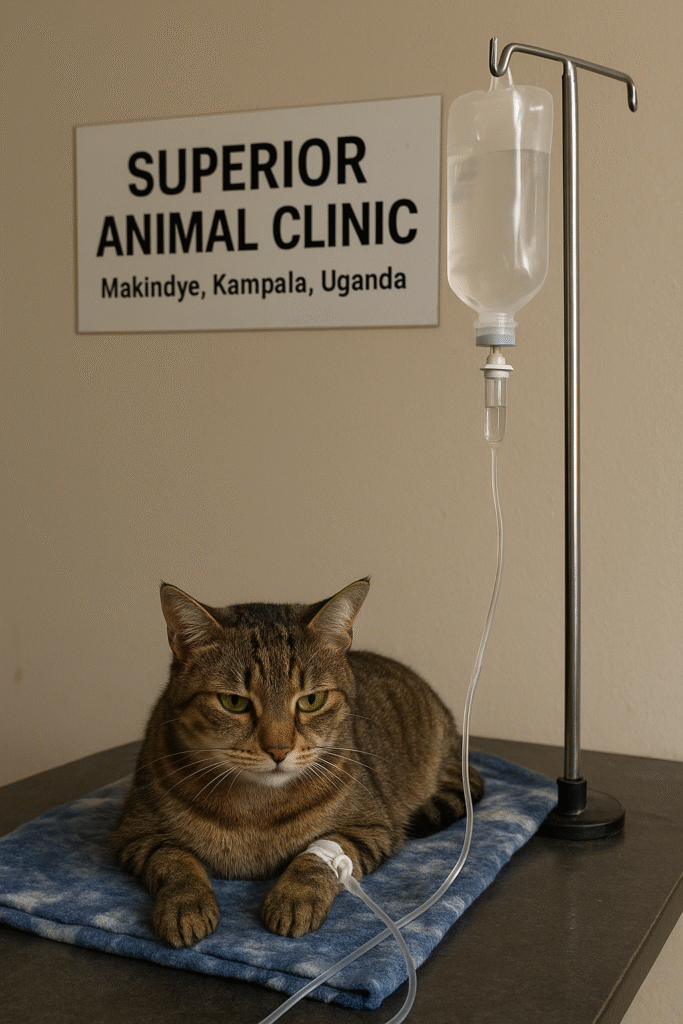
8. Can Panleukopenia be prevented in cats in Kampala?
Yes! Prevention is easier than treatment:
- Vaccinate kittens and adult cats regularly
- Isolate new cats for at least 2 weeks
- Disinfect bedding, cages, and litter boxes
- Avoid contact with stray cats
- Regular vet check-ups at Superior Animal Clinic
9. What happens if I don’t treat my cat’s Panleukopenia?
Without urgent treatment, most cats die within a few days due to dehydration, immune system collapse, and secondary infections. Early intervention is critical in Kampala neighborhoods with high stray cat populations.
10. Where in Kampala is Panleukopenia most common?
Commonly reported in Makindye, Nsambya, Katwe, Kasubi, Old Kampala, Nakawa, Bugolobi, and Lungujja — especially where unvaccinated cats and strays are present.
11. Who is the best vet for treating Panleukopenia in cats in Kampala?
Superior Animal Clinic in Makindye along Salaama Road is the top choice for diagnosis, emergency care, and treatment of Panleukopenia. We serve cat owners across Ntinda, Muyenga, Buziga, Munyonyo, Kololo, Rubaga, Bukoto, Ndejje, Old Kampala, Kasubi, Lungujja, and all surrounding areas.
12. Can home remedies cure Panleukopenia in cats?
No. Home remedies cannot cure the virus, but supportive care like hydration, soft food, and a clean environment can help recovery after veterinary treatment at Superior Animal Clinic.
13. How long does it take a cat to recover from Panleukopenia?
With early veterinary care, most cats recover in 7–10 days. Delayed treatment reduces survival chances, especially in kittens under 6 months.
14. Are there different types of Panleukopenia in cats in Uganda?
Yes, Panleukopenia severity can vary:
- Mild infection: Symptoms like slight vomiting or lethargy; responds well to treatment.
- Severe infection: High fever, bloody diarrhea, extreme dehydration; requires hospitalization.
- Neonatal/kitten infection: Often fatal without urgent care.
At Superior Animal Clinic, we treat all forms promptly to save lives.
15. Can adult cats get Panleukopenia in Kampala?
Yes. While kittens are most vulnerable, unvaccinated adult cats in areas like Makindye, Nsambya, Kololo, Muyenga, and Bugolobi can still contract the virus if exposed to infected cats or contaminated environments.
16. How quickly does Panleukopenia develop in cats?
Symptoms often appear 2–10 days after exposure. In Kampala neighborhoods with high stray populations, outbreaks can spread very fast, especially among kittens and unvaccinated cats.
17. Is Panleukopenia contagious among cats in multi-cat homes?
Yes. The virus spreads easily between cats in the same household through shared litter boxes, food bowls, bedding, or even grooming. Multi-cat households in Buziga, Munyonyo, Nsambya, and Katwe are at higher risk.
18. How can I protect kittens from Panleukopenia in Kampala?
- Ensure kittens get vaccinated starting at 6–8 weeks
- Limit contact with unvaccinated cats and strays
- Keep their environment clean and disinfected
- Schedule regular check-ups at Superior Animal Clinic, Makindye
19. Can Panleukopenia cause permanent health problems in cats?
Yes. In severe or untreated cases, kittens may develop long-term digestive issues, weak immunity, or neurological problems. Early care at Superior Animal Clinic can minimize long-term complications.
20. How long should I isolate a cat diagnosed with Panleukopenia in Kampala?
Infected cats should be isolated for at least 14–21 days, and their bedding, litter, and feeding areas disinfected. This is especially important in Makindye, Nsambya, Buziga, and Muyenga, where stray cats and multi-cat households are common.
21. Does Panleukopenia affect all cat breeds equally in Uganda?
Yes. Panleukopenia is not breed-specific. Both local and exotic breeds in Kampala neighborhoods like Kololo, Ntinda, Bugolobi, and Rubaga can be infected if they are unvaccinated or exposed.
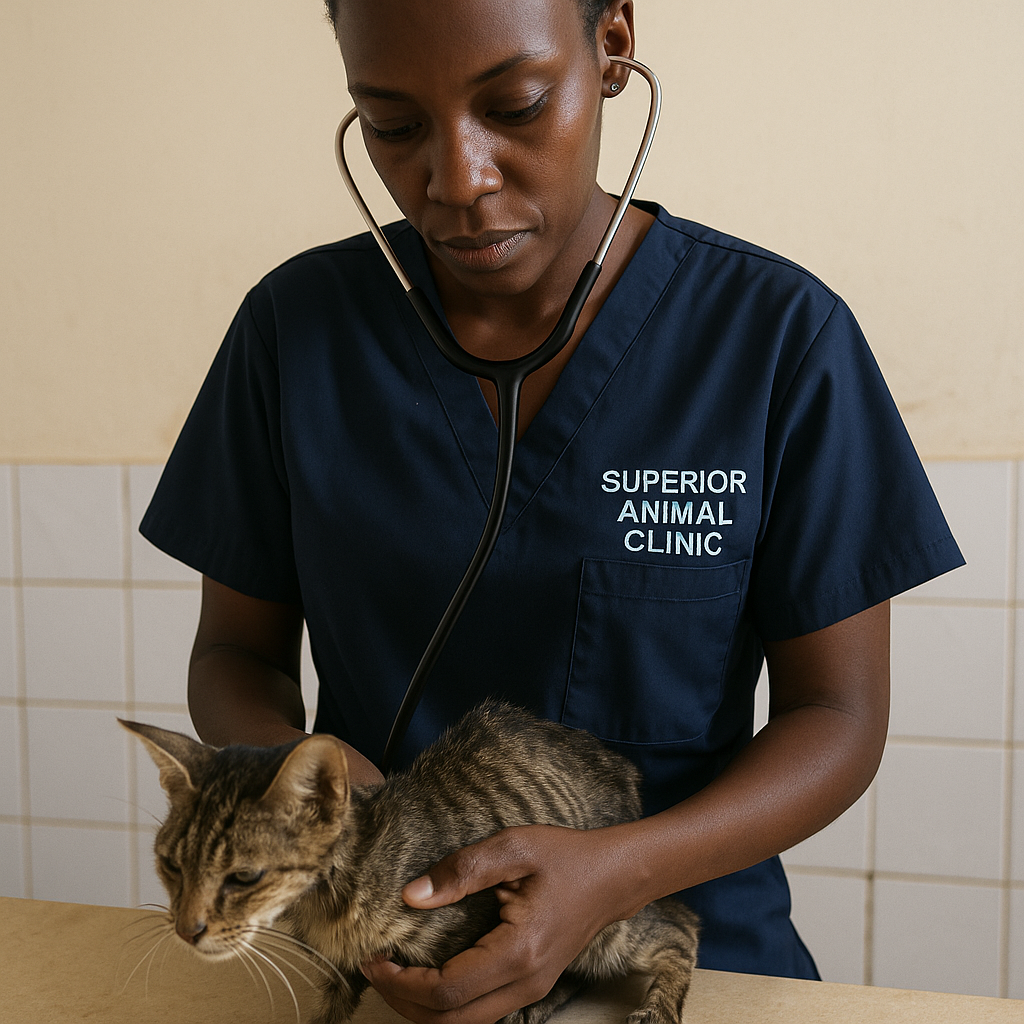
22. Can vaccinated cats still get Panleukopenia in Kampala?
It’s rare, but possible if:
- The vaccine series was incomplete
- The cat’s immune system is weak
- The cat is exposed to a high viral load
That’s why boosters and regular vet check-ups at Superior Animal Clinic are crucial.
23. How soon should I bring my cat to Superior Animal Clinic if I suspect Panleukopenia?
Immediately. Early intervention dramatically improves survival rates. Cat owners from Muyenga, Makindye, Nsambya, Katwe, Buziga, Munyonyo, and Rubaga are advised to seek urgent care at the first sign of symptoms.
24. Can Panleukopenia be treated at home in Kampala?
No. Home care alone cannot cure the virus. Only supportive veterinary care — like IV fluids, medications, and monitoring at Superior Animal Clinic — can save your cat. Home care can support recovery after treatment, not replace it.
25. Are there any seasonal trends for Panleukopenia in Kampala?
Yes. Outbreaks are more common during rainy seasons when stray cats congregate in shelters, markets, and homes, increasing the spread in areas like Katwe, Lungujja, Nsambya, and Makindye.
🐱 Final Word for Cat Owners in Kampala
If your cat shows any signs of weakness, vomiting, or diarrhea — don’t wait.
Visit Superior Animal Clinic in Makindye along Salaama Road, Kampala, for expert Panleukopenia diagnosis and treatment.
We proudly serve cat owners in Ntinda, Old Kampala, Lungujja, Kasubi, Nsambya, Katwe, Zana, Nakasero, Makindye, Buziga, Munyonyo, Mityana, Nakawa, Rubaga, Muyenga, Naguru, Bugolobi, Kabowa, Kabojja, Lugogo, Lubowa, Seguku, Ndejje, Kololo, Mutundwe, Bukoto, Bulindo, and Kulambiro — ensuring every cat gets the care it deserves.

88jl44 – never heard of it before, but I’m always down to try something new! Wish me luck, guys! Check them out 88jl44